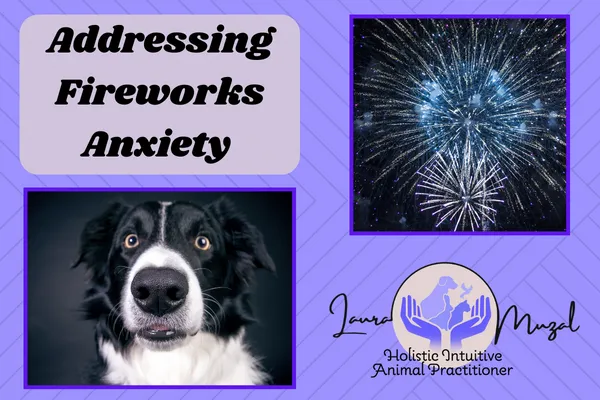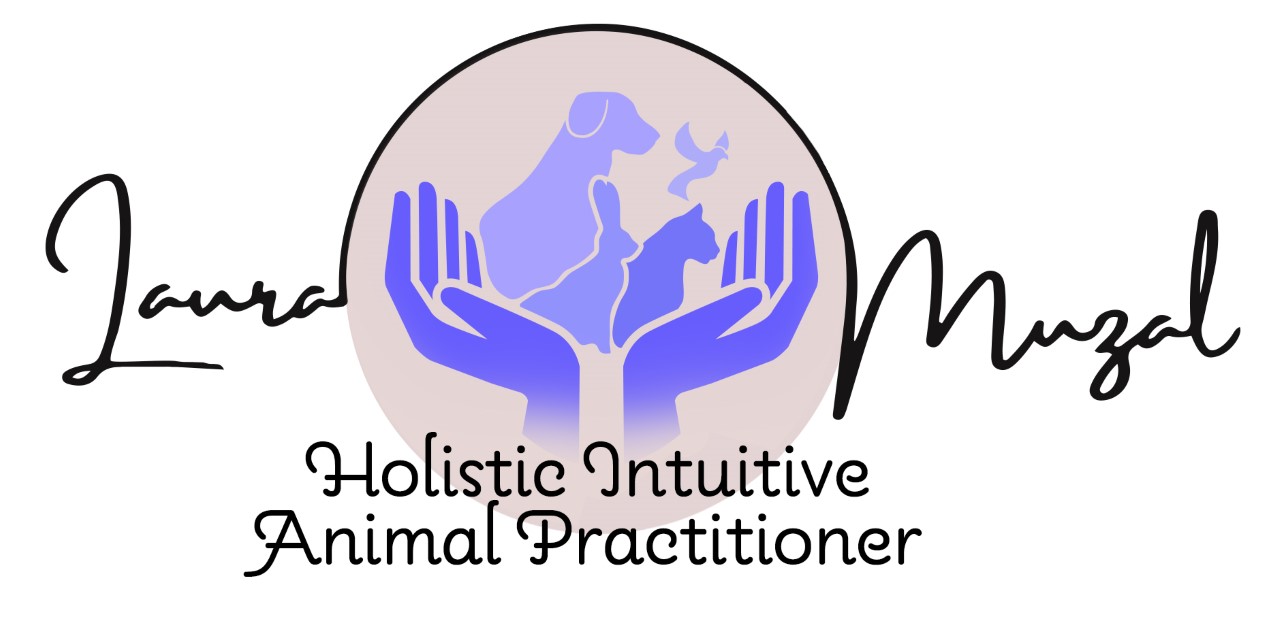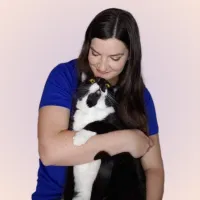Pawsitively Holistic: Your Guide to Pet Wellness

Addressing Firework Anxiety: Effective Solutions for a Calmer Pets

Addressing Firework Anxiety in Dogs: Effective Solutions for a Calmer Canine
Is your dog scared of fireworks? If you're like most pet parents, the answer is probably yes. As someone with both cats and dogs, I've found that holidays with fireworks can be really challenging. Every Fourth of July and New Year's Eve, my home used to be filled with distressed cries, whimpers, and restless pacing. But since adding CBD to their routine, my pets no longer suffer from shaking, pacing, or panicking during fireworks.
Is it Common For Dogs to Experience Fireworks Anxiety?
Based on a 2015 study in Applied Animal Behavior Science, involving 5,000 dogs across 17 breeds, it's evident that dogs are more prone to fireworks anxiety compared to gunshots, thunderstorms, or heavy traffic.
Only 10 percent of dogs showed fear during thunderstorms, 14 percent during gunshots, while a significant 21 percent displayed "strong or very strong signs of being fearful" during fireworks. The study also noted that fear of loud noises tends to increase with age.
However, it's not just dogs affected by fireworks. A 2010 study surveyed 3,527 dogs and cats, revealing that around 46 percent of cats exhibited recognizable fear of fireworks. Although dogs show more outward fear, and cats tend to cower, the duration of fear-based responses didn't differ significantly. Shockingly, six percent of the observed animals suffered injuries due to their fear-based reactions.
What Causes Fireworks Anxiety in Pets?
Loud fireworks can serve as triggers for panic disorder (PD) and canine post-traumatic stress disorder (C-PTSD), leading to more than just fear reactions. Symptoms include unexpected urination, defecation, vocalization, salivation, trembling, shaking, increased or unfocused motor activity, decreased motor activity or freezing, random destruction, and escape behaviors.
And it's not just pets that experience intense fear during fireworks. Human anxiety can create a chain reaction, influencing pets as well. Veterans and survivors of shootings are more prone to PTSD episodes during fireworks holidays, and children's fear of fireworks sounds can trigger anxiety in both cats and dogs.
These panic responses stem from the body's fight-or-flight reaction. When faced with acute stress and external stressors, the sympathetic nervous system activates, releasing hormones that stimulate the adrenal glands. This, in turn, releases adrenaline and noradrenaline, leading to increased heart rate, blood pressure, and respiration. Even after the threat is gone, it can take up to an hour for the body to return to normal, explaining why many dogs continue to pant and panic long after the fireworks cease.
The Risks Associated with Fireworks Anxiety
Displaying signs of fear can indicate various issues for different pets. Some may be grappling with separation anxiety or general anxiety, evident through behaviors like barking, pacing, and panting. However, for others, fear and panic can pose serious risks.
Recent reports highlight instances of older dogs and even puppies experiencing fatal heart attacks during fireworks. Moreover, these loud celebrations contribute to a rise in incidents involving dogs running through sliding glass doors or fleeing. Interestingly, more dogs go missing on July 4th and January 1st than on any other days of the year.
How to Keep Your Pet Calm During Fireworks
Secure your pet indoors. While your instinct might be to have your dog face their fear outdoors, this could lead to panic and potential escape attempts. Instead, ensure your dog has ample exercise earlier in the day, then bring them indoors before the fireworks start.
Maintain a serene environment. Reduce the impact of bright lights by closing curtains or blinds. Playing soft music can also contribute to a calming atmosphere.
Limit interaction with guests. The presence of new people can heighten anxiety in a distressed dog. If there's a gathering, designate a calm space for pets rather than allowing them to roam freely.
Consider wrapping or swaddling. Recent studies suggest that applying weight or slight pressure can have a calming effect on pets, similar to the way weighted blankets help people with anxiety. Explore options like the Thunder Shirt, available at pet stores, or create a DIY version using a comfortable weighted shirt or swaddle.
Ensure your pet can still move freely. Additionally, consider incorporating a subliminal energy healing video for added relaxation.
What to Give Your Pet for Firework Anxiety
Now, you might still be wondering, "What can I give my dog for fireworks anxiety?" Consider a safe and natural solution: Full Spectrum Hemp CBD.
A 2013 article in Neuropharmacology highlights the role of the endocannabinoid (eCB) and glucocorticoid systems in modulating emotional states and extinguishing aversive memories in animals. CBD aids in the extinction of negative emotions associated with triggers like fireworks, effectively managing PTSD, anxiety, and panic disorders in both humans and animals. Notably, a 2019 study in the Permanente Journal reveals that CBD has a calming effect on the central nervous system and is better tolerated than other psychiatric medications.
While some veterinarians may suggest children's Benadryl, it's crucial to note that this drug is not intended for animals and may have adverse effects, straining a dog's liver and kidneys, especially if there are pre-existing issues.
When considering solutions for fireworks anxiety, remember that CBD provides a safer and natural alternative for your cat or dog.
Since introducing CALM: CBD Oil to my pets, they no longer exhibit shaking, pacing, or panic during fireworks, allowing them to rest peacefully without the sedative effects of Benadryl.
Dosage of CBD for Alleviating Firework Anxiety
Cannabinoids found in the hemp plant, notably CBD, interact with the endocannabinoid system present in every mammal. This system, equipped with receptors, guides cells in the body on how to heal and maintain balance. Dogs, possessing twice the amount of receptors compared to humans, benefit greatly from the effectiveness of CBD and other cannabinoids.

Contrary to common belief, the dosage of CBD for dogs is not solely determined by their size and weight. CALM: CBD Oil for Dogs and Cats with anxiety offers a standard dose of 9mg of CBD per 1mL. However, the ideal CBD dosage for alleviating fireworks anxiety may vary among dogs. Some dogs have a more sensitive endocannabinoid system, leading to differing optimal CBD doses.
To address noise and fireworks anxiety, I recommend a starting dose of 9mg before the triggering event. If your pet remains anxious after 15-20 minutes, you can administer another 9mg until desired results are achieved. Recognizing that every dog is unique, Extra Strength CALM offers double the CBD concentration, catering to those with more severe symptoms.
If your dog doesn't respond to the initial dose, it's safe to administer more without fear of overdosing. Numerous studies affirm the safety of cannabis-based medicine, even at high doses. Dogs tolerated doses of up to 640 mg of CBD-rich extract well, with only mild adverse effects such as diarrhea.
Other Ways to Help Your Pets with Firework Anxiety
Frustratingly, fireworks don't necessarily have to be noisy. In fact, many European fireworks displays utilize what's known as "quiet fireworks." A town in Italy has even implemented a law mandating that all fireworks must be silent. Presently, some U.S. cities and towns are advocating for similar legislation, and the number of petitions appears to be on the rise.
To actively contribute, reach out to your local congressional representative to encourage the implementation of stricter fireworks laws. You can express your desire for them to consider making quiet fireworks a requirement in your community. Until such laws are established, you can play a role in reducing fireworks noise by attending organized fireworks displays in your area instead of purchasing your own.
In the meantime, CBD for fireworks anxiety and fear in dogs can offer assistance in keeping your canine companion calm and relaxed during the holiday season.
Have More Questions or Need Personalized Pet Care Advice?
If you have additional questions or need personalized guidance for your beloved pet, I'm here to help. Book a call with me, and let's discuss how to best care for your furry friend. Your pet's well-being is my priority, and I'm dedicated to providing the support and expertise you need. Click here to schedule your consultation today. Together, we can ensure your pet leads a happy, healthy life.
Affiliate Disclosure: Some of the links on this blog are affiliate links. If you make a purchase through these links, the blog owner may earn a commission at no extra cost to you.

